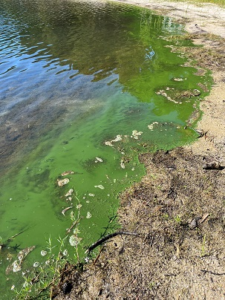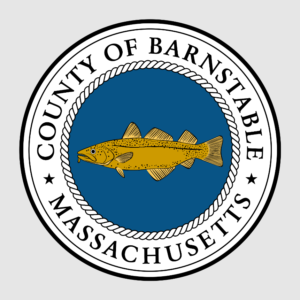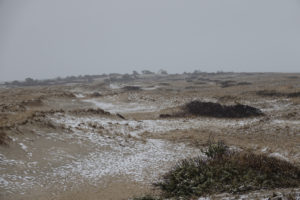
Cyanobacteria at Goose Pond. Town of Chatham.
BARNSTABLE – A Barnstable official gave an update on ongoing efforts to boost water quality at a local pond that has experienced closures due to cyanobacteria blooms.
Barnstable DPW Senior Project Manager Amber Unruh gave an update on the matter at a recent Marstons Mills Long Pond Management Plan meeting.
Unruh presented data from 2021 revealing that cyanobacteria “dominated” the marine algae community in the pond from August through October.
“That’s important to mention because that’s one of the things that occurs in Long Pond that causes us to post warnings and limit our usage of the pond,” she said.
Unruh said the blue-green algae blooms can be harmful to humans and animals. The blooms have led to a series of pond closures and health advisories across Cape Cod.
Unruh said that Marstons Mills Long Pond didn’t experience the blooms prior to 2018 and they’ve been occurring annually since then.
Unruh also shared the findings of a recent study that determined the biggest contributing factor in these blooms.
“When we have excess phosphorus, it can lead to algae blooms, including cyanobacteria blooms and that decreased water clarity that we see,” she said.
Unruh reported that almost 90% of the phosphorus in the pond is coming from the septic systems of 28 homes within 300 feet of the watershed.
Barnstable is planning to sewer the homes as part of its comprehensive wastewater management plan, which would reduce the phosphorus load and improve the pond’s health.
However, that work won’t occur until Phase 3 of the plan, which is at least another 20 years away.
For interim measures, Unruh said homeowners in the area could elect to install phosphorus reducing innovative-alternative (I/A) systems.
Unruh didn’t provide cost estimates, but recent discussions of nitrogen-reducing I/A systems in Falmouth were estimated at around $30,000.
Unruh said a solution Barnstable could be involved with would be to implement floating treatment wetlands in the pond.
These native species would “assimilate phosphorus through their roots,” Unruh said.
She added the DPW will propose a pilot study using the floating wetlands to see if the method could help limit phosphorus in the pond.
By Brian Engles, CapeCod.com NewsCenter






















